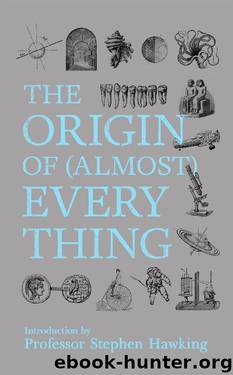New Scientist: The Origin of (Almost) Everything by Graham Lawton & New Scientist

Author:Graham Lawton & New Scientist [Lawton, Graham & Scientist, New]
Language: eng
Format: epub
Tags: Science, History, Nonfiction
ISBN: 9781857886610
Barnesnoble:
Goodreads: 30762400
Publisher: Quercus
Published: 2016-10-25T04:00:00+00:00
WHAT WAS THE FIRST COOKED MEAL?
BREAKFAST: FIBROUS AND BITTER LEAVES; FRUIT. Lunch: bark; fruit; raw monkey meat and brains. Dinner: grubs; leaves; fruit.
No, not the latest food fad from Hollywood, but the diet of our closest living relatives, the chimpanzees. It is not exactly appetising or varied. We, on the other hand, have thousands of foodstuffs to choose from, and also an incredibly versatile range of techniques for altering their chemical composition through the application of heat. In other words, cooking.
Cooking is ubiquitous in humans. All cultures, from the Inuit of the frozen Arctic to the hunter-gatherers of sub-Saharan Africa, are sustained by food that has been chemically and physically transformed by heat. It was an incredible invention. Cooking makes food more digestible and kills off the bacteria that cause food poisoning. But where and when it started is hotly debated. You might call it a food fight.
No food without fire
Cooking cannot happen without fire, so the answer might be found by looking for evidence of the control of flames. This is an incendiary topic, as fire is a tricky thing to identify in the archaeological record. The evidence has literally gone up in smoke, and the remains of a deliberately lit fire are hard to distinguish from those of a natural one caused by lightning. This is why archaeologists look for signs of fire in caves.
Traces of ash found in the Wonderwerk cave in South Africa suggest that hominins were controlling fire at least 1 million years ago, the time of our direct ancestor Homo erectus. Burnt bone fragments also found at this site suggest that Homo erectus was cooking meat. However, the oldest remains of obvious hearths are just 400,000 years old.
The Neanderthals who evolved from Homo erectus some 250,000 years ago certainly created fires, as hearths have been found at many Neanderthal sites, some containing burnt bones. We also know from analysing their dental plaque that Neanderthals spiced up their diets with herbs. But we don’t know whether they habitually cooked their food.
The earliest firm evidence that our own species was cooking dates back just 20,000 years, when the first pots were made in China. The scorch marks and soot on their outer surfaces point to their use as cooking utensils. But all in all, archaeological evidence doesn’t paint a clear picture. We need to look elsewhere.
Around 1.9 million years ago some major changes occurred in hominin biology. Compared with its ancestors, Homo erectus had very small teeth, a small body and a much larger brain. According to a controversial hypothesis put forward by primatologist Richard Wrangham, these changes were driven by cooked food. In fact, Wrangham believes that cooking drove our lineage’s divergence from more ape-like ancestors and that the bodies of Homo sapiens couldn’t exist without cooked food.
To understand why, imagine eating the same diet as a chimpanzee. To gain enough calories to fuel your energy-guzzling brain, you would have to devote almost all of your daylight hours to searching for food. Chimps forage more or less continuously; gorillas and orang-utans eat for nine hours a day.
Download
This site does not store any files on its server. We only index and link to content provided by other sites. Please contact the content providers to delete copyright contents if any and email us, we'll remove relevant links or contents immediately.
The Lonely City by Olivia Laing(4798)
Animal Frequency by Melissa Alvarez(4459)
All Creatures Great and Small by James Herriot(4311)
Walking by Henry David Thoreau(3952)
Exit West by Mohsin Hamid(3823)
Origin Story: A Big History of Everything by David Christian(3687)
COSMOS by Carl Sagan(3617)
How to Read Water: Clues and Patterns from Puddles to the Sea (Natural Navigation) by Tristan Gooley(3460)
Hedgerow by John Wright(3352)
How to Read Nature by Tristan Gooley(3333)
The Inner Life of Animals by Peter Wohlleben(3309)
How to Do Nothing by Jenny Odell(3293)
Project Animal Farm: An Accidental Journey into the Secret World of Farming and the Truth About Our Food by Sonia Faruqi(3212)
Origin Story by David Christian(3194)
Water by Ian Miller(3177)
A Forest Journey by John Perlin(3067)
The Plant Messiah by Carlos Magdalena(2926)
A Wilder Time by William E. Glassley(2857)
Forests: A Very Short Introduction by Jaboury Ghazoul(2836)
